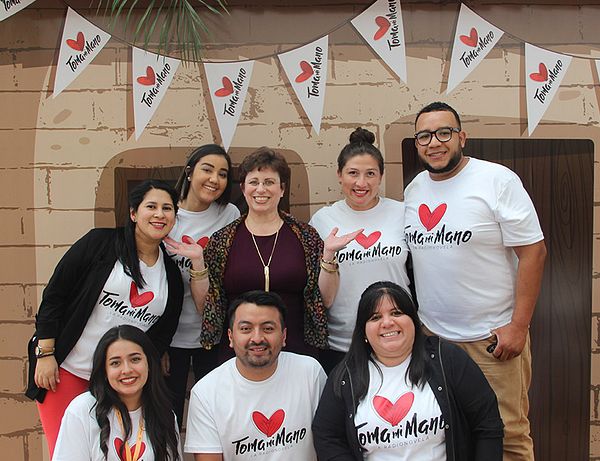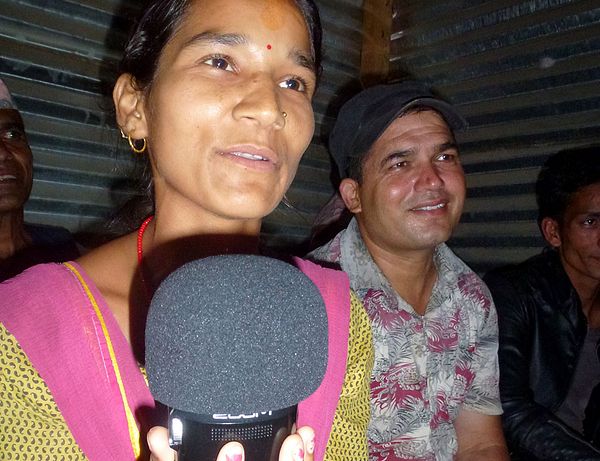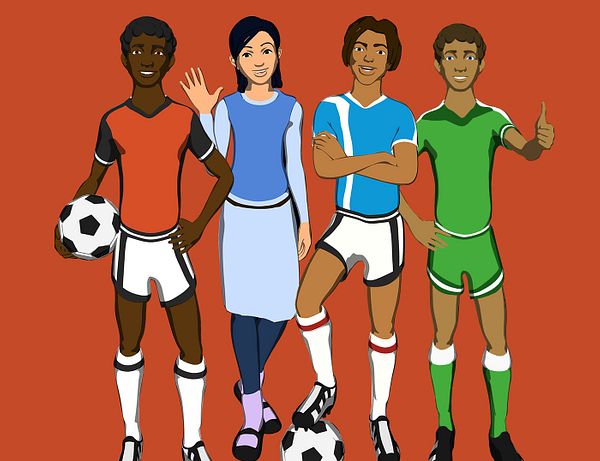Toma Mi Mano
Toma Mi Mano (“Take My Hand”), a 156-episode radio show that began in 2018 in Guatemala, made a triumphant return in 2024 with a new season.

In the ongoing dialogue about societal structures and human rights, the concepts of patriarchy, matriarchy, and feminism have emerged as focal points for discussion and advocacy. As we navigate the complexities of gender inequality and social justice, it becomes imperative to explore the transition from patriarchal norms to matriarchal paradigms, highlighting the benefits of such a shift for the rights of women and girls, as well as for all living beings as a whole.
The patriarchy thrives on dominating not only women and girls but also extends its grasp to nature and animals. Rooted in systems of power and control, patriarchal norms perpetuate exploitation across various spheres of life. Women and girls are subjected to systemic discrimination, limited opportunities, and gender-based violence, reinforcing the patriarchal grip on power dynamics. Similarly, nature and animals are often exploited and commodified within patriarchal frameworks, with environmental degradation and species extinction being symptomatic of this exploitative mentality.
Factory farms and the exploitation of animals for testing, consumption, and entertainment, all underscore the insidious nature of patriarchal oppression. These practices reflect a worldview rooted in domination and exploitation, where the interests of privileged humans are prioritized at the expense of the well-being and autonomy of all sentient beings. Factory farms subject animals to inhumane conditions, treating them as mere commodities for profit, while animal testing perpetuates a culture of violence and exploitation in the name of scientific advancement. Similarly, the use of animals for entertainment purposes, such as in circuses and zoos, reinforces a paradigm where animals are objectified and commodified for human amusement. This exploitation not only perpetuates systemic injustices but also perpetuates a hierarchical power dynamic where humans assert control over other species, further entrenching patriarchal norms of dominance and exploitation. Recognizing and challenging these oppressive practices is essential for fostering a more compassionate and equitable relationship with non-human animals and the natural world. Recognizing and challenging these oppressive practices is a feminist cause and a cause worth fighting in the name of challenging the patriarchy.
Patriarchy, deeply entrenched in many societies worldwide, is a system characterized by male dominance and the subjugation of women and marginalized genders. Under patriarchy, power, resources, and decision-making authority are disproportionately concentrated in the hands of men, while women and non-binary individuals face systemic discrimination, violence, and oppression.
At its core, patriarchy perpetuates exploitative structures that prioritize the interests of men at the expense of women’s rights and autonomy. From unequal pay and limited access to education to restricted reproductive rights and gender-based violence, the consequences of patriarchy are far-reaching and pervasive, impacting the lives of women and girls across various facets of society.
The patriarchal system intertwines with capitalism, fostering wealth inequality and exploiting workforces and people in the relentless pursuit of economic gain. Under patriarchal capitalism, power and resources are concentrated in the hands of a privileged few, while the majority face exploitation and marginalization. This exploitative framework perpetuates wage inequality, precarious working conditions, and systemic oppression, reinforcing hierarchies of power and control. Moreover, the relentless drive for profit often comes at the expense of environmental degradation and ecological destruction, as corporations prioritize short-term gains over long-term sustainability.
The patriarchy perpetuates unsustainable population growth at the expense of the rights of women and girls, including their bodily autonomy and freedom to choose their own family size. In patriarchal societies, women are often denied access to comprehensive reproductive healthcare and family planning resources, limiting their ability to make informed decisions about their bodies and futures. This lack of autonomy not only perpetuates cycles of poverty and inequality but also exacerbates environmental pressures associated with population growth. By challenging patriarchal norms and advocating for women’s rights to reproductive choice and healthcare, we can work towards a more sustainable future that respects the autonomy and agency of all individuals.
Contrary to patriarchy, matriarchy offers a transformative vision centered on regeneration, equality, and collective well-being. In a matriarchal society, power is distributed more equitably among individuals, with an emphasis on collaboration, empathy, and nurturing relationships.
It’s a common misconception to think of matriarchy solely as women-led, but in truth, matriarchy represents a broader paradigm of partnership and equality rather than a direct mirror image of patriarchy. Matriarchy emphasizes shared power, collaboration, and nurturing relationships, moving away from hierarchical dominance seen in patriarchy. This shift towards a partnership-oriented society aims to dismantle oppressive structures and promote collective well-being, benefiting both women and men alike. In embracing empathy and cooperation, matriarchy fosters inclusivity and empowerment, where individuals’ rights and dignity are upheld and respected.
One of the key benefits of transitioning to a matriarchal paradigm is the dismantling of oppressive structures that perpetuate gender inequality and injustice. By prioritizing empathy and cooperation over dominance and competition, matriarchy fosters a culture of inclusivity and empowerment, where the rights and dignity of all individuals are upheld and respected.
Moreover, matriarchy embraces values of reciprocity and community, challenging the prevailing ethos of greed and individualism that characterizes patriarchal societies. Instead of prioritizing material wealth and status, matriarchy emphasizes the importance of sharing resources, uplifting marginalized voices, and fostering solidarity within communities.
Central to the transition to matriarchy is the empowerment of women and girls, who have historically been marginalized and disenfranchised under patriarchal systems. By recognizing and affirming the rights of women to education, economic opportunities, and political representation, matriarchy creates pathways for gender equity and social justice.
Investing in women’s rights and agency not only benefits individuals but also contributes to broader societal progress and prosperity. Studies have shown that when women are empowered, communities thrive, with improvements in health outcomes, educational attainment, and economic development.
Moreover, matriarchal societies prioritize the protection and promotion of reproductive rights, ensuring that women have control over their bodies and reproductive choices. By guaranteeing access to comprehensive healthcare, family planning services, and reproductive education, matriarchy acknowledges the intrinsic value of women’s autonomy and bodily integrity.
Toma Mi Mano (“Take My Hand”), a 156-episode radio show that began in 2018 in Guatemala, made a triumphant return in 2024 with a new season.

PMC launched Rope Guna Fal (“You Reap What You Sow” ) in Nepal in 2021.

BREAKAWAY , an innovative video game and mobile app launched in 2010, used football (U.S. soccer) as a backdrop to address violence against women, bullying, and gender equality.

In a matriarchal society, where values of regeneration, reciprocity, and community prevail, we envision a paradigm shift towards becoming better stewards of the Earth, animals, and the environment. Matriarchal principles prioritize interconnectedness and harmony with nature, recognizing the intrinsic value of all living beings and ecosystems. By fostering a deep sense of respect and reverence for the natural world, matriarchal societies uphold the rights of nature, advocating for its protection and preservation.
Furthermore, in such societies, the rights of animals are safeguarded, with practices such as factory farming and animal testing replaced by ethical and sustainable alternatives that prioritize compassion and well-being.
Additionally, matriarchal societies prioritize universal human rights, ensuring that all individuals, regardless of gender, race, or socioeconomic status, are treated with dignity and respect. By embracing matriarchal values and principles, we can cultivate a future where humans live in harmony with nature, animals, and each other, fostering a more just, equitable, and sustainable world for generations to come.
As we envision a future rooted in equality and justice, it is essential to challenge patriarchal norms and systems that perpetuate gender-based discrimination and violence. The transition from patriarchy to matriarchy represents a fundamental shift in societal values and structures, with profound implications for human rights and the rights of women and girls. By elevating feminist movements and advocating for the principles of matriarchy, we can pave the way for a more inclusive, equitable, and sustainable world for generations to come.
Population Media Center (PMC) harnesses the power of entertainment education to confront patriarchal norms worldwide. Through innovative mediums like radio dramas across Asia and Africa, telenovelas in Mexico and Latin America, and the acclaimed series “East Los High” in the United States, PMC drives social change by challenging ingrained gender biases. By weaving compelling narratives into popular entertainment, PMC sparks conversations and inspires audiences to question traditional gender roles and power dynamics. With a commitment to creating diverse, inclusive stories, PMC paves the way for a more equitable and flourishing global society, where every individual has the opportunity to thrive regardless of gender.